Straight off, I want to say that Clint Eastwood’s Jersey Boys was better than I thought it was going to be. Do not confuse that with praise, because I wasn’t expecting much, and I have never thought of Frankie Valli and the Four Seasons as more than a footnote in the history of pop music. The movie did nothing to convince me otherwise. (I am sure to hear about that, but I continue to cringe every time Valli’s impersonator hits one of those notes that’s pitched to a dog’s hearing.) I will say, however, that the largely older-skewing audience I saw the film with mostly seemed to have a good time with the movie. (I exempt from this the gent a few seats over who snored mightily, occasionally jolted himself into consciousness, checked the time and promptly returned to the embrace of Morpheus.) What I’m getting at here is that if you have an appreciation for Mr. Valli’s vocalizing, you will possibly get more out of this than I did. But the truth is this is so not a good movie if you’re looking for anything more than some guys who can perform slick tribute band covers of Valli et cie’s greatest hits.
It isn’t just that Eastwood gives us the hoariest of hoary showbiz biopics — rags, riches, more rags, personal tragedy, regeneration, validation, celebration — but he gives us a shamefully sloppy movie that lurches from scene to scene, offers quite a few unintentional laughs, evidences little feel for the music and often manages to make Valli (John Lloyd Young) seem like an extra in his own movie. Granted, Eastwood had help from writers Marshall Brickman and Rick Elice — adapting their own stage show — but Eastwood is also the producer, so he had more than a little to say about this screenplay. The film partly reproduces the stage show’s conceit of having the characters stop and directly address the audience, and as a device it works most of the time. That is, until you realize that everyone has his say except Valli himself, who barely tells us anything. Some of these pronouncements are solid and amusing, while others — like us being told that if we think finding out that Tommy DeVito (Vincent Piazza) has been stealing from the group caused Frankie to dump him “then you’re not from Jersey” — are painfully corny. (The whole laid-on-with-a-trowel Italian American dese-dem-and-dose stuff is pretty dire.)
This is also a movie where people who are now preposterously too old for their roles are still playing them because they did onstage. Worse, this is a movie that starts in 1951, packs Tommy off for a stretch in the big house for six months and, one scene later, has a girl wanting to go see The Blob — a movie that didn’t exist till 1958. Did the narrative just jump ahead seven years? Apparently not, since Tommy’s six-month incarceration ends a scene later. Characters come and go and disappear and reappear in an often bewildering manner. Big moments are supremely cheesy and unintentionally funny, like hitting on the Four Seasons name because of the giant neon sign for the Four Seasons bowling alley in the background of the shot. If that’s not bad enough, there’s a scene where their record producer, Bob Crewe (Mike Doyle), makes them watch a scene from Billy Wilder’s Ace in the Hole (1951) where Jan Sterling gets pimp-slapped, and someone remarks on the soon-to-flow tears, only to have Crewe counter — wait for it — “Big girls don’t cry,” and we cut to the song being performed. The less said about the creepiness of Valli singing “My Eyes Adored You (But I Never Laid a Hand on You)” as a lullaby for his daughter the better.
All — or at least most — of this would be forgivable if the film at least embraced its pop-music ethos, but it never really does. And, yes, this is largely because Eastwood is the squarest director around. I don’t mean that as a pejorative. His straightforward classicism is square, but that’s who he is, and a glitzy musical is not part of his nature. (He proves this with a vengeance in his attempt at a big production number at the very end — especially when he has the characters awkwardly freeze in triumphant poses.) Plus, he can’t seem to decide if this really is supposed to be a warts-and-all biography or not. So while Valli and his comrades have mob ties, they’re “nice” mobsters, personified by Christopher Walken’s downright cuddly Gyp DeCarlo. At best, it’s a watchable mess (right down to its prestige-picture muted color and Eastwood’s trademark bad old-age make-up), but it is a mess. If you’re keen on Valli’s music, you can probably bump it up a notch. Rated R for language throughout.



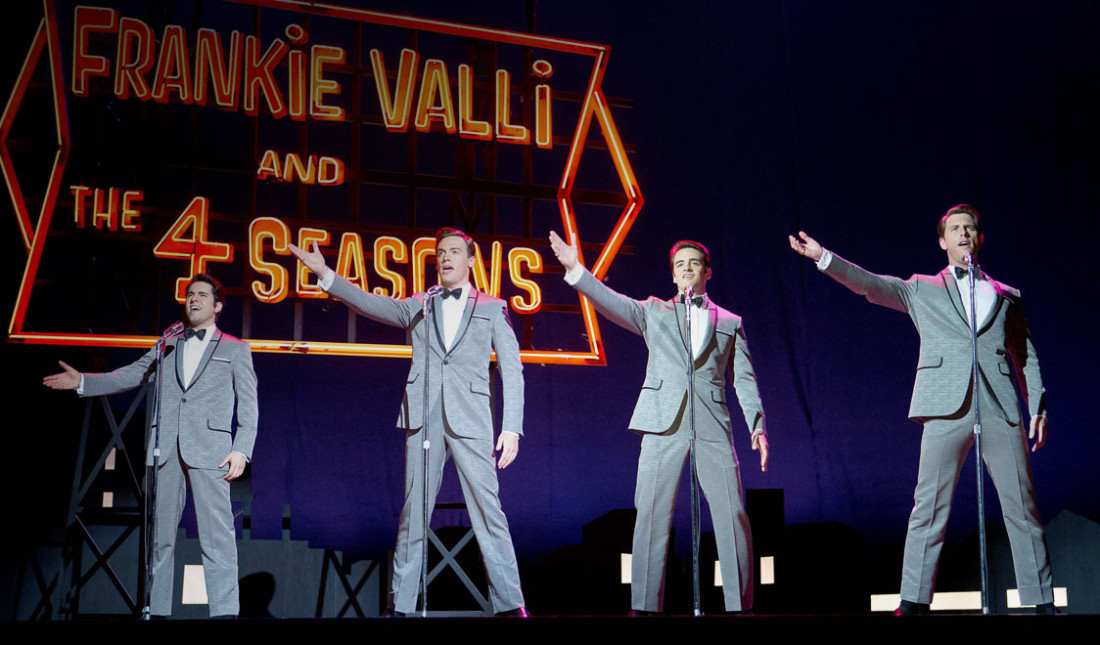
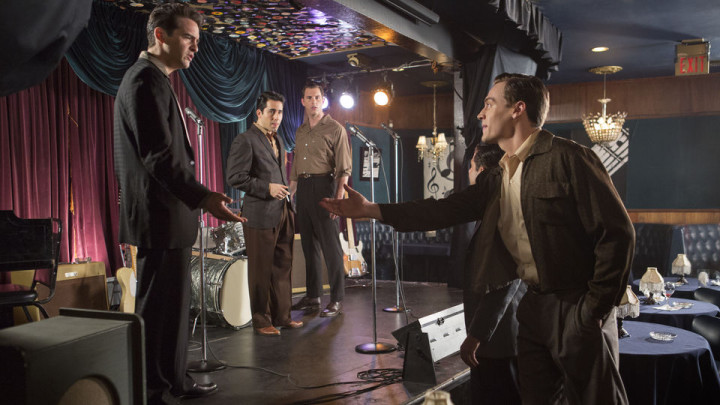
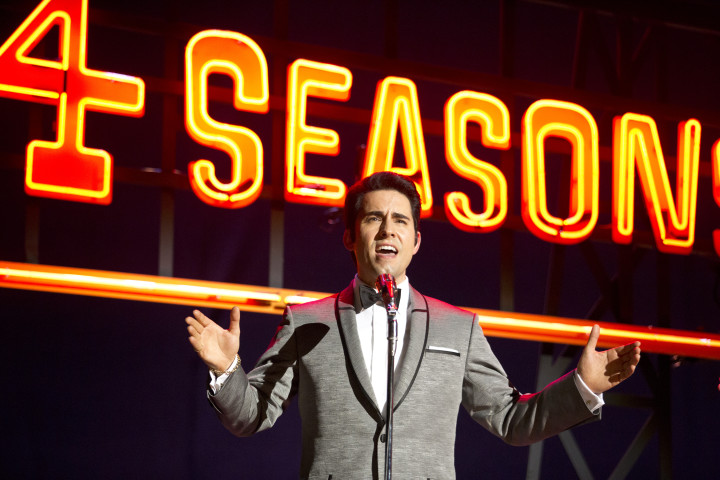
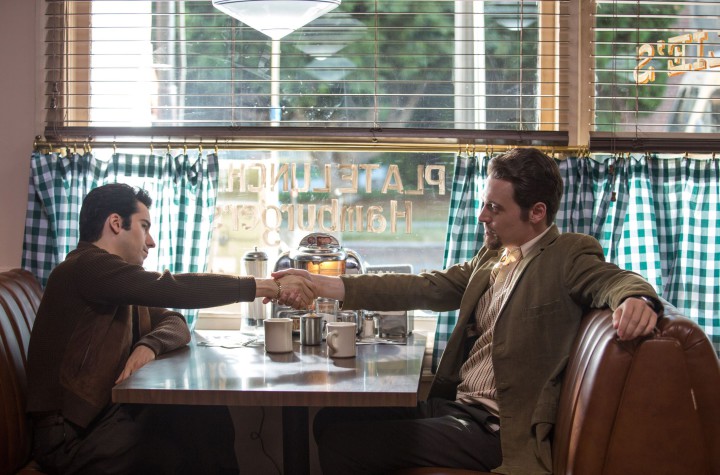
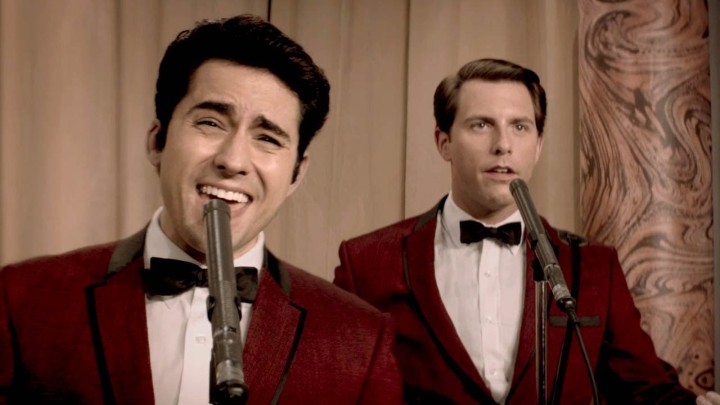
A tiresome review from a pretentious critic. Don’t take yourself so seriously, Hanke. Most viewers I know of all ages loved the film.
That’s why it has more negative than positive reviews?
As a fan of the stage show, I agree that the film lacked something but I wouldn’t describe it as ‘sloppy’ it’s fast paced and energizing. Overall I think it was good and very loyal to the stage show, good cast also with Vincent Piazza, Mike Doyle and Christopher Walken . I’ve never been a fan of John Lloyd Young though, I cant stand the man. He’s rubbish compared to Valli.